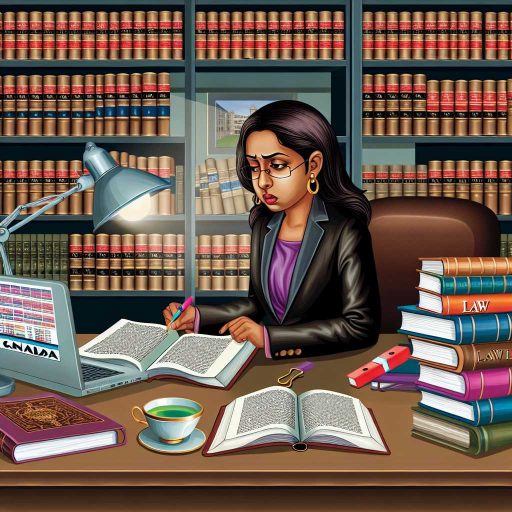Overview of the Role of Law Clerks in Canada
Understanding Law Clerks
Law clerks play a vital role in the Canadian legal system.
They assist lawyers in preparing legal documents and research.
Moreover, they help manage case files and organize information.
This support allows lawyers to focus on client representation.
In Canada, law clerks often specialize in specific areas of law.
This specialization enhances their effectiveness in supporting legal practices.
Key Responsibilities
Law clerks execute various essential tasks in legal settings.
One primary duty involves drafting legal documents.
They prepare pleadings, motions, and notices for court cases.
Additionally, they conduct research to support litigation efforts.
This research often includes analyzing statutes and case law.
Furthermore, clerks summarize findings for lawyers’ review.
Collaboration with Legal Professionals
Law clerks often work closely with lawyers and clients.
Effective communication is key in this collaborative environment.
Law clerks must understand client needs and case specifics.
This understanding enables them to produce relevant documents.
They also help maintain client relationships through updates.
Ultimately, this collaboration supports a seamless legal process.
The Importance of Law Clerks in the Legal System
Law clerks significantly contribute to the efficiency of legal services.
They ensure timely preparation and filing of legal documents.
Without their assistance, lawyers would face an overwhelming workload.
Their meticulous attention to detail prevents costly errors.
Their contributions enhance the overall effectiveness of law firms.
Educational Requirements and Qualifications for Law Clerks
Overview of Educational Background
Law clerks typically hold a degree in law or a related field.
Many employers prefer candidates with a Bachelor of Laws (LL.B.) degree.
Unlock Your Career Potential
Visualize a clear path to success with our tailored Career Consulting service. Personalized insights in just 1-3 days.
Get StartedA Juris Doctor (J.D.) degree can also be beneficial for law clerks.
Moreover, completing a paralegal program is an excellent alternative.
Certification and Licensing
While certification is not mandatory, it can enhance job prospects.
Candidates often pursue certification from recognized bodies.
For instance, the National Association of Legal Assistants offers certification programs.
Additionally, provincial requirements may vary regarding legal assistant certifications.
Practical Experience
Hands-on experience plays a crucial role in becoming a successful law clerk.
Internships or co-op placements provide essential practical knowledge.
Many law schools encourage students to gain this experience during their studies.
Entry-level positions may also offer valuable learning opportunities.
Essential Skills and Competencies
Law clerks must possess strong research skills.
Analytical thinking is essential to draft legal documents accurately.
Effective communication skills are crucial when interacting with clients.
Additionally, attention to detail is vital for document preparation.
Continuing Education Opportunities
Law clerks should consider ongoing education to stay competitive.
Workshops and seminars can enhance specific skills and knowledge.
Online courses from accredited institutions offer flexibility for busy professionals.
Furthermore, membership in professional organizations often provides educational resources.
Common Types of Legal Documents Prepared by Law Clerks
Contracts
Law clerks often draft various types of contracts.
These may include agreements related to employment, sales, or leases.
They ensure all terms are clearly defined and legally binding.
Furthermore, they may review existing contracts for compliance with laws.
Court Pleadings
Court pleadings are essential documents in legal proceedings.
Law clerks prepare complaints, answers, and motions for attorneys.
Each pleading must comply with specific rules and formatting requirements.
Additionally, they conduct legal research to support the arguments presented.
Real Estate Documents
In real estate, law clerks prepare various legal documents.
This includes purchase agreements and title searches.
They ensure accuracy in property descriptions and ownership details.
Moreover, they assist in drafting leases for residential and commercial properties.
Wills and Estates
Wills and estate planning documents are crucial for individuals.
Law clerks help draft wills that reflect the client’s wishes.
They also prepare documents related to estate administration.
Furthermore, they may assist in probate applications and related filings.
Corporate Documents
Court clerks often deal with various corporate documents.
This may include articles of incorporation and corporate bylaws.
They help maintain compliance with corporate governance regulations.
Additionally, they prepare minutes of meetings for proper documentation.
Family Law Documents
Family law includes sensitive legal documents.
Law clerks prepare divorce petitions and custody agreements.
They ensure that all necessary information is accurately presented.
Moreover, they may assist in mediation documentation as needed.
Find Out More: Career Opportunities for Legal Researchers in Canada
Step-by-Step Process of Drafting Legal Documents
Understanding the Assignment
Law clerks start by comprehending the assignment’s requirements.
They review the necessary information and clarify any uncertainties.
Additionally, they consult with lawyers to gather specific instructions.
Conducting Thorough Research
Next, law clerks conduct extensive legal research.
They examine relevant statutes, case law, and legal precedents.
This research ensures documents are grounded in solid legal principles.
Furthermore, they utilize reliable legal databases for accurate information.
Outlining Key Points
After research, clerks outline the key points of the document.
This outline serves as a roadmap for the drafting process.
Subsequently, they organize the information logically and clearly.
This structure helps to maintain a coherent flow throughout the document.
Drafting the Document
Next, the drafting phase begins.
Clerks write the first draft based on the outline and research.
During this phase, they maintain a clear and concise writing style.
As they draft, clerks ensure proper legal terminology is used.
Reviewing and Revising
After completing the draft, law clerks review their work carefully.
They check for clarity, accuracy, and adherence to legal standards.
Moreover, they look for grammatical and typographical errors.
Revising the draft improves its overall quality significantly.
Finalizing and Formatting
Once revisions are complete, clerks finalize the document.
They format it according to the required legal standards.
This includes adding proper citations and footnotes as needed.
Additionally, clerks ensure the document is professionally presented.
Submitting for Approval
The final step involves submitting the document for approval.
Law clerks present the document to their supervising lawyer.
They address any feedback and make necessary adjustments.
This collaborative process ensures that the final product meets all requirements.
Uncover the Details: Key Legal Software Tools for Canadian Law Clerks
Importance of Legal Research in Document Preparation
Foundational Role of Legal Research
Legal research serves as the cornerstone of effective document preparation.
It ensures that documents comply with current laws and regulations.
Furthermore, it helps in identifying relevant case law and statutes.
Law clerks rely on this knowledge to create accurate legal documents.
Process of Conducting Legal Research
The research process begins with understanding the legal issues at hand.
Clerks use various databases to find relevant legal precedents.
Next, they analyze case law to see its applicability.
This thorough examination forms the basis for drafting documents.
Utilizing Research in Document Drafting
Once research is complete, law clerks begin drafting documents.
They incorporate findings directly into the legal text.
This practice helps to cite authorities and support arguments effectively.
Moreover, it ensures that documents reflect current legal standards.
Collaborating with Legal Teams
Law clerks often collaborate with lawyers during document preparation.
They present their research findings for review and discussion.
This collaboration enhances the quality and precision of legal documents.
Ultimately, it fosters a team-driven approach to legal work.
Uncover the Details: How Technology is Changing Legal Research in Canada

Collaboration between Law Clerks and Lawyers
Understanding Roles
Law clerks play a vital role in the legal field.
They assist lawyers by preparing legal documents.
Moreover, they conduct research to support ongoing cases.
These responsibilities allow lawyers to focus on strategy.
Communication is Key
Effective communication strengthens the partnership between clerks and lawyers.
Law clerks regularly update lawyers on case developments.
They discuss document drafts and seek feedback promptly.
This ongoing dialogue enhances the quality of legal work.
Document Preparation Process
The document preparation process begins with understanding requirements.
Clerks gather necessary information and data from various sources.
Then, they draft initial documents based on this information.
Subsequently, they submit these drafts to lawyers for review.
Research and Analysis
Law clerks conduct extensive legal research.
The aim is to find relevant precedents and regulations.
Furthermore, they analyze case law to support arguments effectively.
In addition, research findings help refine document content.
Quality Control
Quality control is an essential aspect of document preparation.
Clerks verify the accuracy of facts and citations in documents.
Moreover, they ensure compliance with legal guidelines.
This meticulous review process minimizes errors significantly.
Final Review and Submission
After revisions, the final draft is prepared for submission.
Lawyers review the document one last time before filing.
This collaborative approach ensures all legal documents meet high standards.
Ultimately, effective teamwork enhances client outcomes.
Explore Further: Trust and Estate Practitioners in Multigenerational Wealth
Best Practices for Ensuring Accuracy in Legal Documents
Understanding the Role of Law Clerks
Law clerks play a vital role in preparing legal documents.
They assist lawyers by conducting research extensively.
Additionally, they draft and review various legal papers.
Emphasizing Importance of Accuracy
Accuracy in legal documents is crucial for successful outcomes.
Errors can lead to significant legal repercussions.
Therefore, law clerks must adhere to high standards.
Utilizing Proper Research Techniques
Thorough research helps ensure the accuracy of legal documents.
Law clerks should utilize reputable legal databases.
Moreover, they must cross-check information from multiple sources.
Using reliable sources builds credibility in documents.
Implementing Quality Control Measures
Developing a checklist is a foundational quality control measure.
This checklist should include essential elements required for documents.
Regular reviews by colleagues can help catch errors.
Effective Communication with Legal Teams
Maintaining open lines of communication is essential.
Law clerks should frequently update lawyers on their progress.
Clarifying expectations can prevent misunderstandings.
Adhering to Formatting Guidelines
Consistent formatting enhances document readability.
Law firms often have specific formatting requirements.
Law clerks must familiarize themselves with these guidelines.
Final Review Before Submission
A final review is a critical step in document preparation.
This review should focus on spelling, grammar, and punctuation.
Additionally, law clerks should verify all citations.
Continuous Learning and Development
Law clerks should pursue ongoing education opportunities.
Attending workshops and seminars can enhance their skills.
Furthermore, staying updated on legal changes is beneficial.
Ethical Considerations for Law Clerks in Document Preparation
Importance of Confidentiality
Confidentiality is paramount in the legal profession.
Law clerks must protect sensitive client information at all times.
They should refrain from discussing cases outside the office.
Moreover, sharing documents must occur through secure channels.
Avoiding Conflicts of Interest
Law clerks must identify potential conflicts of interest early.
They should clearly understand the legal frameworks they operate within.
In addition, they must disclose any personal interests that could affect their work.
Furthermore, maintaining impartiality is essential in all tasks.
Adhering to Legal Standards
Law clerks must stay updated on relevant legal regulations.
They should ensure all documents meet the required legal standards.
Accuracy in document preparation is critical for client outcomes.
This requires continuous education and training.
Integrity in Reporting
Integrity is fundamental in legal document preparation.
Law clerks must report facts honestly without distortion.
Furthermore, they should avoid any form of deception.
Reliability in work fosters trust between clients and legal professionals.
Responsibility to the Public
Law clerks have a duty to serve the public interest.
They must prioritize justice in their document preparation activities.
Additionally, they should promote access to legal information.
This fosters a fair and equitable legal system for all.




